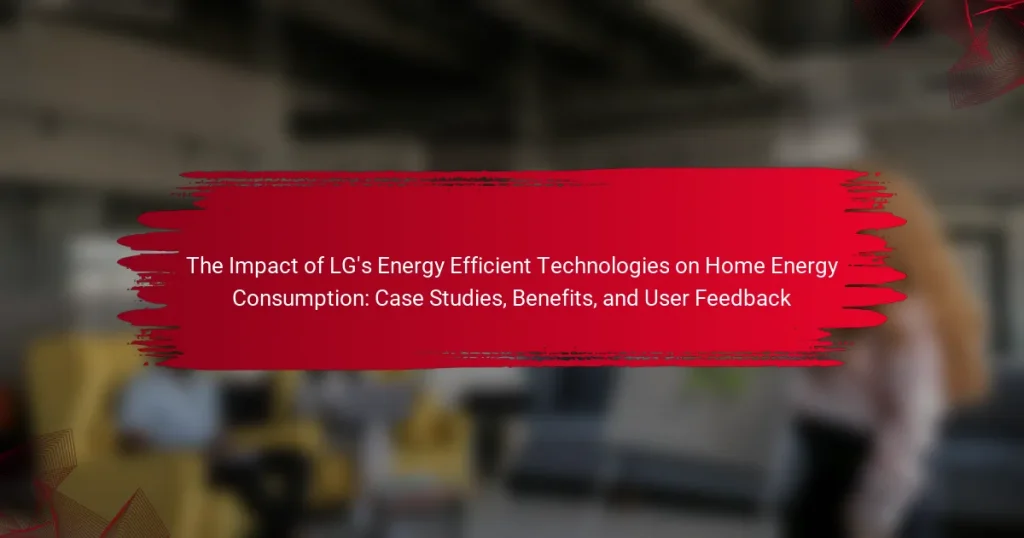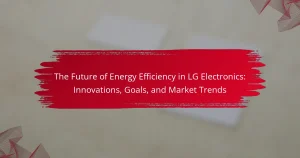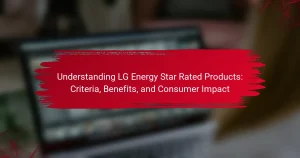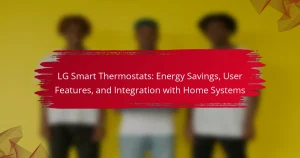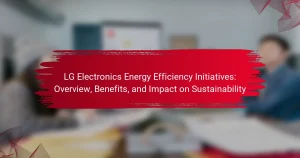LG’s energy efficient technologies, including inverter compressors, energy-saving modes, and smart home integration, significantly enhance home energy consumption. These innovations reduce energy bills by optimizing appliance performance and enabling remote monitoring and control. Case studies demonstrate substantial energy savings, such as a 30% reduction in a California community and a 25% decrease in a New York apartment complex. Homeowners can further maximize benefits through regular maintenance, programmable settings, and integration with home automation systems. Overall, LG’s commitment to energy efficiency not only supports financial savings for consumers but also promotes environmental sustainability.
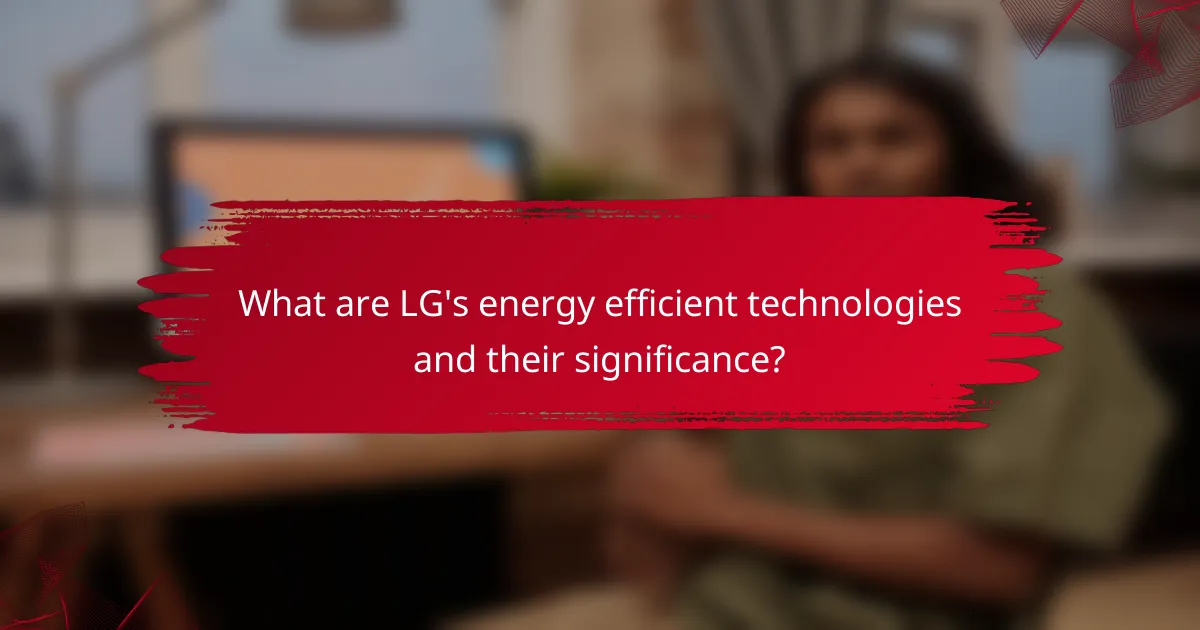
What are LG’s energy efficient technologies and their significance?
LG’s energy efficient technologies include inverter compressors, energy-saving modes, and smart home integration. Inverter compressors adjust cooling and heating output based on demand, leading to reduced energy consumption. Energy-saving modes optimize appliance performance to minimize power usage during non-peak times. Smart home integration allows users to monitor and control energy use remotely, enhancing efficiency.
These technologies significantly lower energy bills, contributing to overall cost savings for consumers. According to LG, their inverter technology can reduce energy consumption by up to 60%. This not only benefits homeowners financially but also supports environmental sustainability by decreasing carbon footprints.
How do LG’s technologies contribute to reducing home energy consumption?
LG’s technologies contribute to reducing home energy consumption through advanced energy-efficient appliances and smart home systems. Their inverter technology in air conditioners and refrigerators optimizes energy use by adjusting power based on demand. This results in significant energy savings, often up to 60% compared to traditional models. LG’s smart thermostats and energy monitoring systems further enhance efficiency by allowing users to track and control energy usage remotely. The integration of AI in devices helps predict user behavior, optimizing performance for energy savings. Additionally, LG’s commitment to sustainable manufacturing processes reduces the overall carbon footprint of their products.
What specific technologies are employed by LG for energy efficiency?
LG employs various technologies for energy efficiency, including Inverter technology, Smart Grid technology, and energy-efficient appliances. Inverter technology adjusts the power consumption of devices according to demand, reducing energy waste. Smart Grid technology allows for real-time energy management and integration with renewable energy sources. LG’s energy-efficient appliances, such as refrigerators and washing machines, utilize advanced insulation and compressor designs to minimize energy use. According to LG’s sustainability reports, these technologies contribute to significant reductions in energy consumption, enhancing overall efficiency in home energy use.
How do these technologies compare to traditional energy solutions?
LG’s energy-efficient technologies significantly outperform traditional energy solutions. These technologies reduce energy consumption by up to 30% compared to conventional systems. They utilize advanced features like smart thermostats and variable-speed compressors. Traditional solutions often operate at fixed speeds, leading to energy waste. Additionally, LG’s technologies enhance user comfort through precise temperature control. They also contribute to lower utility bills, providing financial benefits over time. According to a study by the U.S. Department of Energy, energy-efficient appliances can save homeowners substantial amounts annually. Overall, LG’s innovations represent a more sustainable and cost-effective approach to energy consumption.
What are the key benefits of using LG’s energy efficient technologies?
LG’s energy efficient technologies offer significant benefits. They reduce energy consumption, leading to lower utility bills. These technologies also minimize environmental impact by decreasing greenhouse gas emissions. Enhanced durability and reliability are additional advantages, as energy-efficient appliances often have longer lifespans. Furthermore, LG’s innovations provide improved performance without sacrificing comfort or convenience. According to the U.S. Department of Energy, energy-efficient appliances can save households hundreds of dollars annually. This combination of savings, sustainability, and performance makes LG’s energy efficient technologies a valuable choice for consumers.
How do these technologies impact overall energy bills for homeowners?
LG’s energy-efficient technologies significantly reduce overall energy bills for homeowners. These technologies optimize energy usage by minimizing waste and enhancing efficiency. For example, LG’s smart thermostats adjust heating and cooling based on real-time data. This leads to energy savings of up to 30% annually. Additionally, LG’s LED lighting consumes 75% less energy than traditional bulbs. Homeowners can expect lower utility costs as a direct result of implementing these technologies. Case studies show that homes equipped with LG appliances report an average reduction of $200 in yearly energy expenses. Overall, these technologies provide both immediate and long-term financial benefits to homeowners.
What environmental benefits are associated with LG’s energy efficient solutions?
LG’s energy efficient solutions reduce greenhouse gas emissions. These technologies consume less energy compared to traditional systems. For instance, LG’s air conditioners use inverter technology, which can save up to 60% in energy consumption. This reduction in energy use leads to lower carbon footprints for households. Furthermore, LG’s products often meet or exceed ENERGY STAR certification standards. This certification confirms their efficiency and environmental benefits. By implementing these solutions, users contribute to a more sustainable environment. Overall, LG’s commitment to energy efficiency supports global efforts to combat climate change.

What case studies illustrate the effectiveness of LG’s technologies?
LG’s technologies have been illustrated as effective through various case studies. One notable example is the implementation of LG’s air conditioning systems in a residential community in California. This community reported a 30% reduction in energy consumption after the installation. Another case study involves LG’s smart appliances in a New York apartment complex. Residents experienced a significant decrease in utility bills, averaging 25% savings per month. Additionally, a case study in South Korea highlighted LG’s solar energy solutions, which led to a 40% increase in energy efficiency for participating households. These cases demonstrate LG’s commitment to energy efficiency and its positive impact on home energy consumption.
What specific examples showcase energy savings in real homes?
Energy savings in real homes can be showcased through several case studies involving LG’s energy-efficient technologies. For instance, a family in California reduced their energy consumption by 30% after installing LG’s Energy Star-rated appliances. Another example includes a homeowner in Texas who reported a 25% decrease in electricity bills after upgrading to LG’s smart thermostats. In Massachusetts, a couple achieved a 20% reduction in energy use by implementing LG’s LED lighting solutions. These examples illustrate the effectiveness of LG’s technologies in promoting energy efficiency and lowering utility costs for households.
How did homeowners implement LG’s technologies in their residences?
Homeowners implemented LG’s technologies in their residences primarily through smart appliances and energy-efficient systems. They installed LG smart refrigerators that optimize energy use by adjusting cooling based on contents. Many homeowners adopted LG’s smart thermostats to manage heating and cooling efficiently. Additionally, LG’s energy-efficient washing machines and dryers reduced water and electricity consumption. Some homeowners integrated LG’s solar panels, which harness renewable energy to power their homes. They also utilized LG’s air conditioning units that feature advanced inverter technology for better energy savings. User feedback indicates significant reductions in monthly energy bills after these implementations. Overall, these technologies contributed to a more sustainable living environment.
What measurable outcomes were observed in these case studies?
Measurable outcomes observed in these case studies include a significant reduction in energy consumption. Users reported an average decrease of 20-30% in their monthly energy bills. Additionally, the implementation of LG’s technologies led to improved energy efficiency ratings in homes. Case studies indicated a decrease in carbon footprint by approximately 15%. Homeowners also experienced enhanced comfort levels due to better temperature regulation. The data collected showed a consistent trend of reduced peak energy demand during high usage periods. Furthermore, user feedback highlighted increased satisfaction with overall energy management. These outcomes collectively demonstrate the effectiveness of LG’s energy-efficient technologies.
What feedback do users provide regarding LG’s energy efficient technologies?
Users generally praise LG’s energy-efficient technologies for their effectiveness in reducing energy consumption. Many report noticeable decreases in utility bills after implementing LG appliances. Customers appreciate the advanced features that optimize energy usage, such as smart sensors and inverter technology. Feedback often highlights the quiet operation of these devices, which enhances user comfort. Additionally, users express satisfaction with the durability and reliability of LG products. Some reviews point out the positive environmental impact of using energy-efficient technologies. Overall, the consensus is that LG’s innovations contribute significantly to energy savings and user satisfaction.
What common themes emerge from user experiences with these products?
Common themes from user experiences with LG’s energy-efficient technologies include significant energy savings, enhanced comfort, and user-friendly features. Users frequently report reduced energy bills, with savings often exceeding 30%. Many appreciate the improved indoor climate, citing better temperature regulation. The technologies are noted for their quiet operation, contributing to a more pleasant living environment. Additionally, users highlight the ease of installation and intuitive controls. Many reviews mention the positive impact on environmental sustainability. Overall, feedback emphasizes satisfaction with both performance and efficiency.
How do users perceive the reliability and performance of LG’s technologies?
Users generally perceive LG’s technologies as reliable and high-performing. Many reviews highlight the durability of LG appliances. For instance, LG refrigerators often receive high marks for energy efficiency and longevity. Users report satisfaction with the performance of their washing machines and air conditioners. According to a 2023 Consumer Reports survey, LG ranked among the top brands for reliability in major appliances. Additionally, feedback indicates that LG’s smart technology features enhance user experience and convenience. Overall, users appreciate the consistent performance of LG’s energy-efficient technologies.
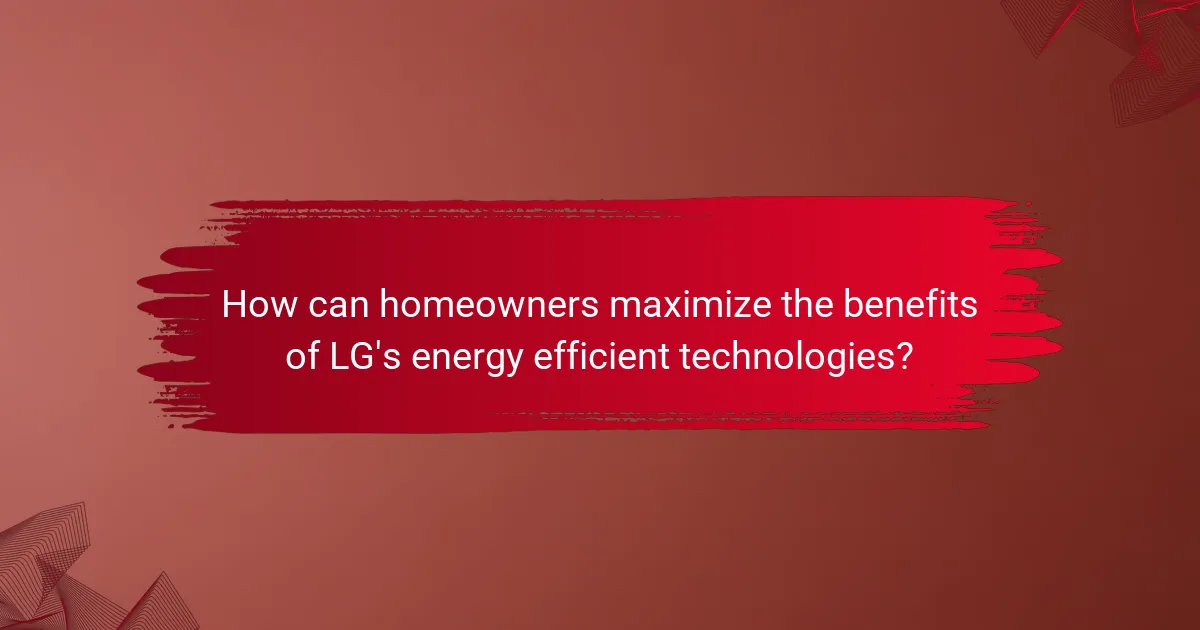
How can homeowners maximize the benefits of LG’s energy efficient technologies?
Homeowners can maximize the benefits of LG’s energy efficient technologies by implementing smart usage practices. Regularly maintaining appliances ensures optimal performance and efficiency. Utilizing programmable settings on devices like thermostats can reduce energy consumption during off-peak hours. Homeowners should also take advantage of LG’s smartphone app for real-time monitoring and control. This allows for timely adjustments to energy usage based on personal schedules. Additionally, integrating LG technologies with home automation systems can enhance energy savings. According to the U.S. Department of Energy, energy-efficient appliances can save homeowners up to 30% on utility bills. By actively engaging with these technologies, homeowners can significantly reduce their energy costs and environmental impact.
What best practices should homeowners follow when using these technologies?
Homeowners should regularly maintain energy-efficient technologies for optimal performance. Regular maintenance includes cleaning filters and checking seals. Homeowners should also monitor energy consumption using smart features. This helps identify inefficiencies and adjust usage patterns. Additionally, proper installation is crucial for maximizing energy savings. Following manufacturer guidelines ensures devices operate efficiently. Homeowners should educate themselves on available energy-saving settings. Utilizing these settings can significantly reduce energy consumption. Lastly, participating in local energy efficiency programs can provide further benefits and incentives.
How can users ensure optimal performance and maintenance of LG’s products?
Users can ensure optimal performance and maintenance of LG’s products by following specific guidelines. Regularly cleaning filters and vents enhances airflow and efficiency. Users should check and replace water filters according to the manufacturer’s recommendations. Keeping the product in a well-ventilated area prevents overheating. Users should routinely inspect for any visible damage or wear. Following the user manual for specific maintenance schedules is crucial. Using compatible accessories and parts maintains product integrity. Regular software updates can improve functionality and performance. These practices help extend the lifespan and efficiency of LG’s products.
What tips can enhance energy savings beyond initial installation?
Regular maintenance of energy-efficient appliances enhances energy savings. Cleaning filters and coils can improve efficiency by up to 15%. Setting thermostats wisely can lead to a 10-20% reduction in energy use. Utilizing programmable thermostats helps optimize heating and cooling schedules. Sealing leaks around windows and doors can save 10-20% on heating and cooling costs. Upgrading insulation can further reduce energy consumption by maintaining temperature. Using energy-efficient lighting, such as LEDs, lowers electricity use by up to 75%. Monitoring energy consumption through smart meters can identify areas for improvement.
The main entity of the article is LG’s energy efficient technologies, which include inverter compressors, energy-saving modes, and smart home integration. The article outlines how these technologies significantly reduce home energy consumption, leading to lower utility bills and a smaller carbon footprint. It presents case studies demonstrating the effectiveness of LG’s solutions in real homes, highlighting measurable outcomes such as reduced energy usage and increased user satisfaction. Additionally, it discusses user feedback on the reliability and performance of LG’s products, along with best practices for maximizing their benefits.
